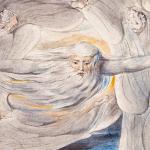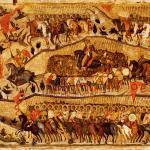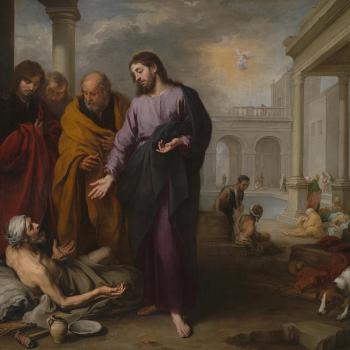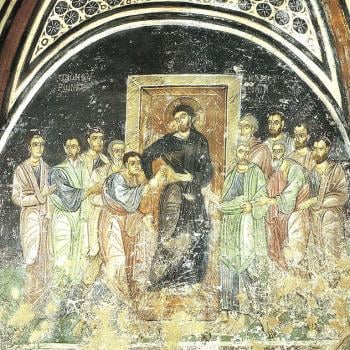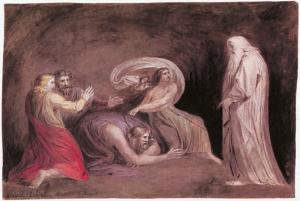 The king needed help, he needed guidance, he needed the knowledge and wisdom of the recently deceased prophet. What was he to do? Summoning the dead back from the grave could result in the destruction of his soul, and yet, he felt that if he did not go and get that help, all hope would be lost. And yet the question remained: Who could it be that could help him? Who could it be that would be able to connect the realm of the dead with the realm of the living, and make the soul of the dead walk once again among the living?
The king needed help, he needed guidance, he needed the knowledge and wisdom of the recently deceased prophet. What was he to do? Summoning the dead back from the grave could result in the destruction of his soul, and yet, he felt that if he did not go and get that help, all hope would be lost. And yet the question remained: Who could it be that could help him? Who could it be that would be able to connect the realm of the dead with the realm of the living, and make the soul of the dead walk once again among the living?
The king had heard rumors; the mother of his cousin, the commander of chief of his army, was said to have the gift. She was as fearless as her son Abner; while he was gifted in bringing the living to the realm of the dead, she had an equal and opposite power. The realm of the dead was a realm of dread darkness, and those who played with the dead and summoned the to speak with the living felt the impact and contamination of that contact; they were themselves almost like the walking dead, more free in the tombs than they were in the courts of kings.
King Saul knew what he had to do:
So Saul disguised himself and put on other garments, and went, he and two men with him; and they came to the woman by night. And he said, “Divine for me by a spirit, and bring up for me whomever I shall name to you.” The woman said to him, “Surely you know what Saul has done, how he has cut off the mediums and the wizards from the land. Why then are you laying a snare for my life to bring about my death?” But Saul swore to her by the LORD, “As the LORD lives, no punishment shall come upon you for this thing.” Then the woman said, “Whom shall I bring up for you?” He said, “Bring up Samuel for me” (1 Sam. 28:8-11 RSV).
Saul’s disguise did not work. When he got close to the old woman, she saw who he was and cried out against his deception. She feared Saul. She feared he had trapped her. But this was no trap. “Do not be afraid, and do as you have been asked, and you will face no danger from me.”
And the woman said to Saul, “I see a god coming up out of the earth.” He said to her, “What is his appearance?” And she said, “An old man is coming up; and he is wrapped in a robe.” And Saul knew that it was Samuel, and he bowed with his face to the ground, and did obeisance (1 Sam. 28:13b-14 RSV).
The dead one had been brought back to the realm of the living; the dead prophet had come and Saul hoped Samuel would do as he bid. The dead in the grave might normally find their existence far from the living, but yet, they still existed; they still had a sense of who and what they are. They might be mere shadows of their former selves, they might need blood and sacrifice to make their way back to the realm of the living for a short while, but they could be brought back for they did not perish into nothingness.
Then Samuel said to Saul, “Why have you disturbed me by bringing me up?” Saul answered, “I am in great distress; for the Philistines are warring against me, and God has turned away from me and answers me no more, either by prophets or by dreams; therefore I have summoned you to tell me what I shall do.” And Samuel said, “Why then do you ask me, since the LORD has turned from you and become your enemy? The LORD has done to you as he spoke by me; for the LORD has torn the kingdom out of your hand, and given it to your neighbor, David. Because you did not obey the voice of the LORD, and did not carry out his fierce wrath against Amalek, therefore the LORD has done this thing to you this day. Moreover the LORD will give Israel also with you into the hand of the Philistines; and tomorrow you and your sons shall be with me; the LORD will give the army of Israel also into the hand of the Philistines” (1 Sam. 28: 15-19 RSV)
Saul had disobeyed the dictates of God, and now he went even further, to the edge of darkness itself as he faced the shade of Saul. He got his wish. How the Witch of Endor did it, we are not told, but we can imagine what she did following the example of Homer and how the dead were brought back to life in the Homeric Epics. The dead can be brought back at the expense of the living. Blood and guts, the sacrifice of innocents, it was believed, could be given to the hungry dead so that they could briefly come back among the living once again. But what they were given would be quickly consumed, and then the dead would have to return once again to the netherworld.
Yet, it could be asked, are we truly to believe Saul was successful, that he indeed saw and talked with Samuel? Origen believed it was:
But it was written that Saul knew it was Samuel. If it was not Samuel, it would be necessary to write, “And Saul supposed it was Samuel.” Yet it was written, Saul knew. No one knows what does not exist.[1]
St. Anthony of Padua, recognizing that possibility, did not give an answer; he only related the various possibilities:
The woman told him she had seen and old and glorious man, wrapped in a priestly mantle; and when Saul understood that it was Samuel, he fell down before him. According to Josephus, the soul of Samuel asked, “Why have you disturbed my rest, that I should be raised up?” According to the “Histories”, some way regarding this raising that an evil spirit appeared in the form of Samuel, or that it was an illusion that Saul took to be Samuel. Some say it was only Samuel’s soul, wearing the likeness of a body by God’s permission; while yet others say that it was only his body, animated with that life-principle which we share with animals, while his soul rested in its own place. [2]
Yet, Origen was adamant; it was indeed Samuel. It was not an illusion. It was not a demon. Scripture indicated it was Samuel, for he knew and spoke as a prophet even from the realm of the dead. Indeed, Samuel was able to speak for God in a way which demons would not:
Can also a little demon know this, that after a kind has been appointed with the anointing oil of a Prophet, that tomorrow Saul and his sons with him will forfeit their lives? Tomorrow you and your sons with you.
So these things show that what is recorded is not false, and that Samuel is the one who ascended. What then is a medium doing here? What is a medium doing bringing up the soul of a righteous man? [3]
Even if we were to read the story as a myth and positivistic history, we should at least acknowledge that Origen is right in the way the text presents itself to us. There is no indication that we are meant to believe it was not Samuel, but rather, some demon who responded to Saul. It was Samuel, and he continued to have a share of his prophetic powers in the realm of the dead. What is key here is not how the Witch of Endor summoned the dead, nor if we are to follow Origen in believing it truly happened as stated, but that the text itself indicates it was Samuel and that this was not seen as something strange or untraditional to believe that the dead continued exist in some form or another after they have died. While we might not have all the details of what Israelites believed about the afterlife, we see that they had some vague notion that the dead continued to exist after death, and that such life remained active and continued with some of the same blessings which they received in their life. Samuel was a prophet and he remained so after death; he could be summoned and speak forth – but woe to the one who summons the dead against the wishes of God, for that brings not a blessing but a curse. The curse here is the end of Saul’s reign, and not just his reign, but also the complete transference of his kingship to a different dynasty; he had done what was forbidden and his charism would be taken from him and given to someone else, indeed had already been given over to David.
In Christ, all things are new; in Christ, all things change. In Christ, we see that the dead no longer are so detached from the living; in Christ, they can have eternal life, for God is a God of the Living and not the dead. As shown on Mt. Tabor, we can now communicate with the dead made alive in Christ in and through Christ himself. We are not called to sacrifice the living to bring up the dead, rather, we come to the dead in Christ and find them already alive, thriving with spiritual gifts which they can use to bless us; there is no more sacrifice, there is only the opening of the heart and the gift of the Spirit which can bring us together with the crowd of witnesses, the crowd of those who have gone before us. Now, in Christ, we are called to pray and work for each other’s eternal glory instead of our own self-seeking in the realm of the living dead.
[Image=Raising the Spirit of Samuel by Henri Fuseli (http://siteslab.unc.edu/viscomi/Breach_City/) [Public domain], via Wikimedia Commons]
[1] Origen, “Homily on 1 Kings 28” in Homilies on Jeremiah; Homily on I Kings 28. Trans. John Clark Smith (Washington, DC: CUA Press, 1998), 323.
[2] St. Anthony of Padua, Sermons for Sundays and Festivals. Volume II. trans. Paul Spilsbury (Padova; Edizioni Messaggero Padova, 2007), 29-30.
[3] Origen, “Homily on 1 Kings 28,” 325.
Stay in touch! Like A Little Bit of Nothing on Facebook


